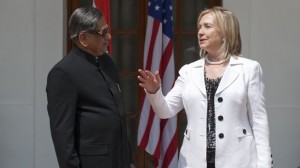 Hilary Clinton is in India right now. Not coincidentally, after a four-year survey of a site in the southern Indian state of Andhra Pradesh, the government of India has announced that the Tumalapalli mine there could hold up to 150,000 tons of recoverable uranium. Srikumar Banerjee, secretary of the Department of Atomic Energy, told the Times of India “It’s confirmed that the mine has 49,000 tonnes of ore, and there are indications that the total quantity could be three times that amount.” Mr. Banerjee added, “If that be the case, it will become the largest uranium mine in the world.”
Hilary Clinton is in India right now. Not coincidentally, after a four-year survey of a site in the southern Indian state of Andhra Pradesh, the government of India has announced that the Tumalapalli mine there could hold up to 150,000 tons of recoverable uranium. Srikumar Banerjee, secretary of the Department of Atomic Energy, told the Times of India “It’s confirmed that the mine has 49,000 tonnes of ore, and there are indications that the total quantity could be three times that amount.” Mr. Banerjee added, “If that be the case, it will become the largest uranium mine in the world.”
But there’s a catch. The deposit is not very high quality. S.K. Malhotra, spokesman for the Department of Atomic Energy, said “it is not high-grade uranium, it is low-grade uranium. We have not found any high-grade uranium in India to match that found in Australia.” India will still have to import.
Moreover, it doesn’t address the real problem in India’s nuclear program – the Nuclear Suppliers Group’s (NSG) move to tighten conditions for transferring uranium enrichment and reprocessing (ENR) technologies. Russia has officially said that tightening will not affect its transfers to India, and Secretary of State Clinton is expected to clarify America’s view during her current trip to India.
The Hindu reports, “India, on its part, feels, as articulated by Foreign Secretary Nirupama Rao during the recent High Technology Cooperation Group (HTCG) meeting, that the U.S. has been slow in transferring cutting-edge technology though it had considerably pared the export control list for India.”
The paper also noted, “At the same time, the U.S. has its set of concerns, especially with the Nuclear Liability Act and the absence of a bilateral civil nuclear agreement between India and Japan having hindered the entry of U.S. companies General Electric and Westinghouse (both have equity from Japanese companies).”
Indo-American relations are rapidly becoming much more important for numerous reasons, including India’s economic rise and its strategic location in South Asia. Getting this right matters to both nations.